Seeking asylum, migrant encampment grows in Mexico amid uncertainty over US policy
ABC News spoke with CBP Chief Raul Ortiz about the humanitarian crisis.
The bridge that connects Hidalgo, Texas, to Reynosa, Mexico, has become a path of uncertainty and fear for thousands of families in search of opportunity.
Amid ongoing ambiguity over the U.S.'s immigration policies, an encampment of migrants has swelled to about 2,200 over the past year, according to estimates from nonprofits working in the area. The sea of tents is about a block away from the international bridge in the northern Mexican city of Reynosa.
Jessica Leon, a mother from El Salvador who has been in Reynosa for seven months with her young children, told ABC News that life in the camp is "dangerous" and "difficult."
"We're exposed to a lot of danger here -- like the cartels, for example. Here, anyone can come in at any time. We're extremely vulnerable to many dangers," she said.
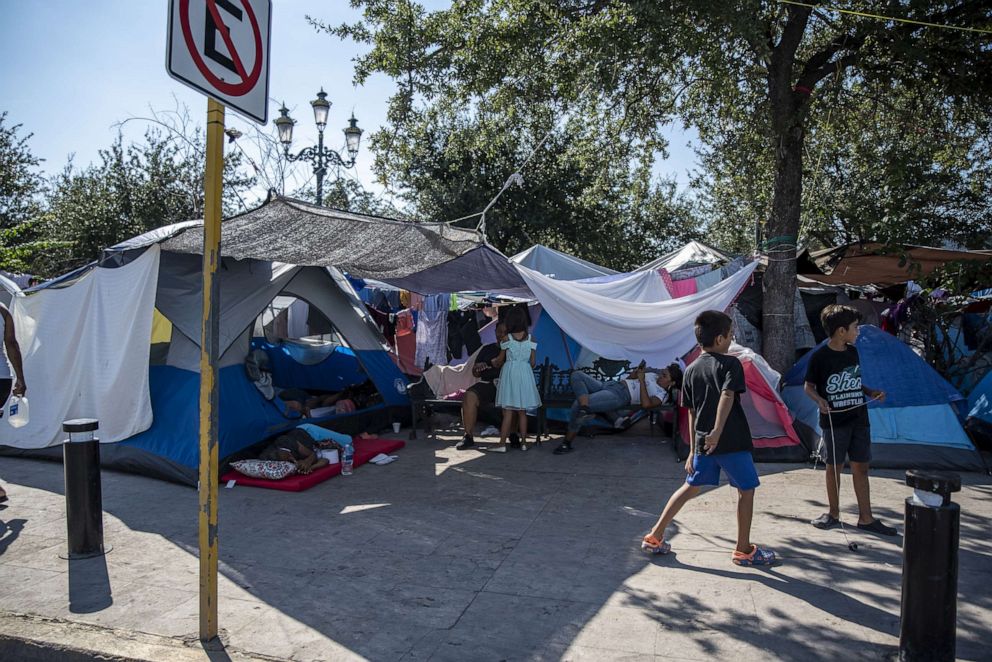
"I'm waiting for asylum, and we have been waiting for a long time. And when you don't see results, you feel desperation," Leon added.
As the families cope with difficult living conditions, the fate of their journeys partly depends on how long the Biden administration continues using Title 42, a policy beefed up by the Trump Administration during the pandemic. It allows U.S. Customs and Border Protection to expel thousands of migrants amid the COVID-19 pandemic without giving them a chance to apply for asylum within the United States.
Title 42 refers to a clause of the 1944 Public Health Services Law that allows the government to prevent migrants from entering the U.S. during public health emergencies; however, advocates challenging the Administration's use of the order in court have argued that U.S. law does not allow the government to expel individuals seeking asylum without due process.
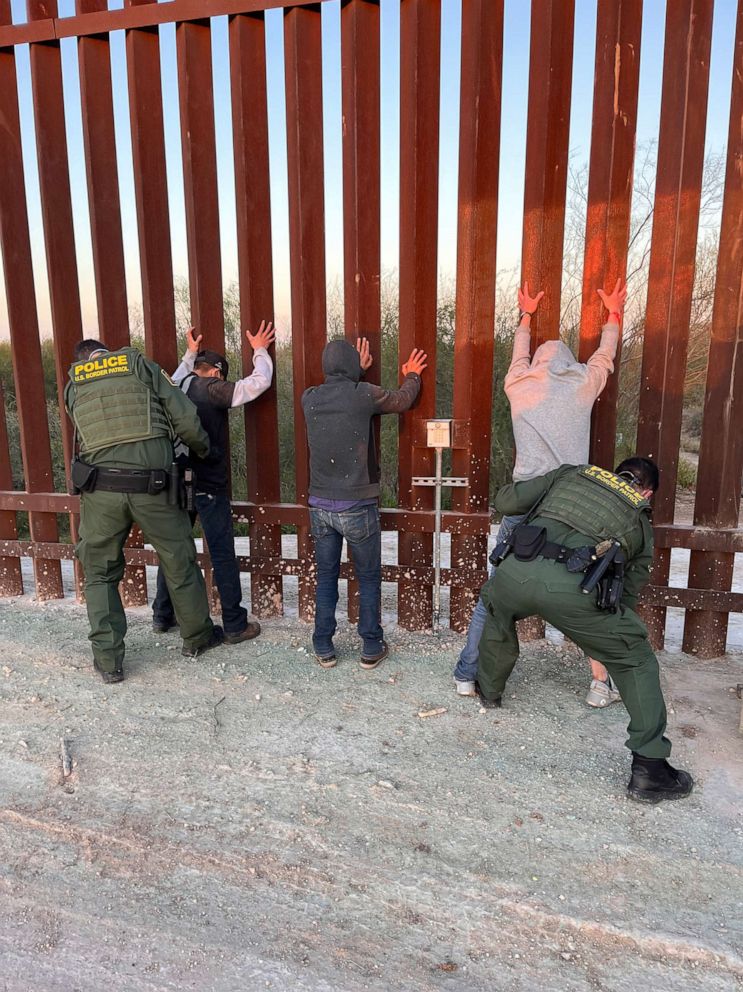
Customs and Border Protection encountered 1.7 million people at the U.S.-Mexico border in 2021, according to data released by the agency last month -- the highest ever over the span of a year. About 1.2 million of those encountered were expelled under Title 42, CBP said.
U.S. Border Patrol Chief Raul Ortiz spoke exclusively with ABC News Correspondent Mireya Villarreal about the growing issues along the border. While he acknowledges Title 42 is a tool they'd like to keep using, his agency is preparing for it to eventually go away.
"We know it's not going to last forever as the health pandemic starts to wane... that we may not have Title 42 forever," Ortiz said. "So we have to make adjustments to be able to prepare for that. And so what I'm doing is making sure I have processing coordinators that can fulfill some of those duties and responsibilities and then making sure our agents are safe."
"You know, one point I had two, three thousand agents in a quarantine status almost every day," he added. "Right now, I may have two or three hundred in a quarantine status. So we're doing better at protecting ourselves. And I think that's some of those things that have to happen for us to be successful."
Chief Ortiz said he recognizes morale is waning and regularly reminds agents not to get caught up in policy talks.
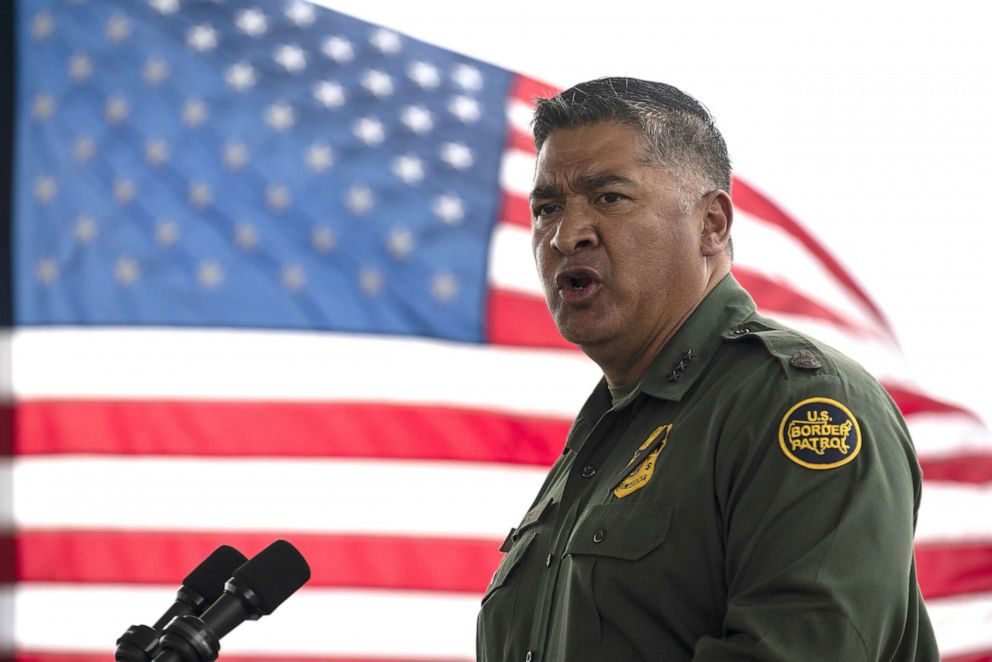
"I know I don't have enough agents, I know I don't have enough equipment, and then I know I need to close some gates and gaps. That would put us in a better position for success," he added.
Title 42 was ramped up during the pandemic by the Centers for Disease Control and Prevention. In a statement to ABC News, CDC representatives said every 60 days the agency reviews "the status of the COVID-19 pandemic and associated public health risks."
The latest assessment completed at the end of January determined that the use of Title 42 remains "in effect," the CDC said, citing the impact of the pandemic and a "surge in cases and hospitalizations since December due to the highly transmissible Omicron variant."
Back across the border in Reynosa, Mexico, Felicia Rangel-Samponaro, director of The Sidewalk School, an American nonprofit organization that runs solely on donations, told ABC News that the school "had to grow at a very rapid pace" to accommodate a rise in children asylum seekers from various countries.
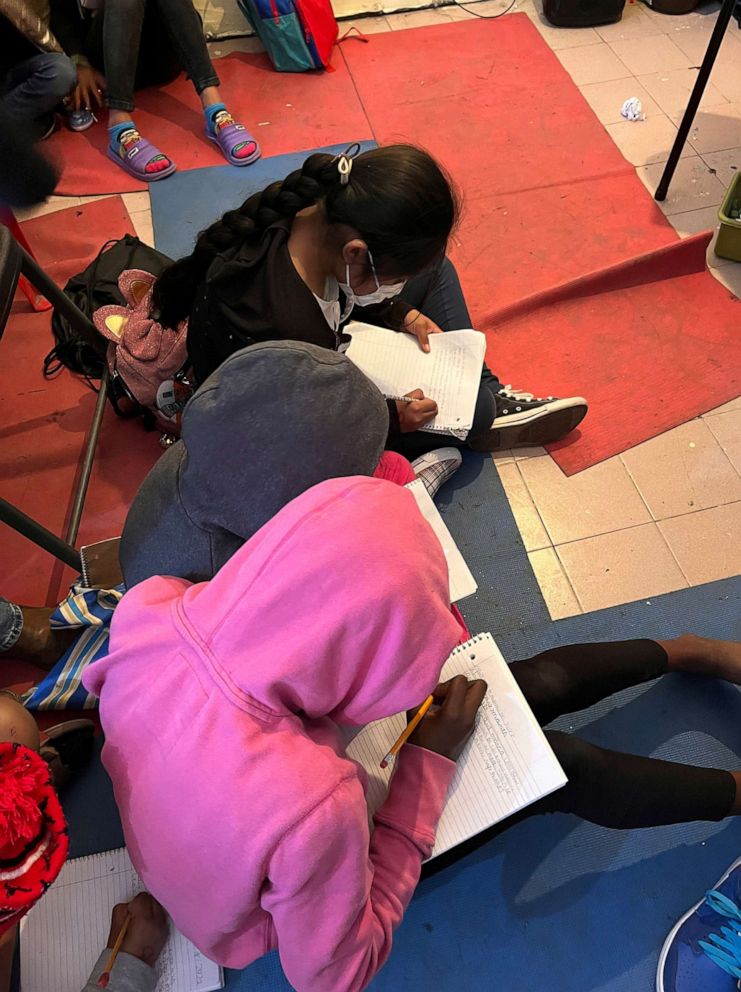
The organization provides clothing and food to families who lack resources and live in conditions that make it exceedingly difficult to cook.
Rangel-Samponaro said that she has watched the encampment grow each day as the numbers of migrants swelled and said that the problem "never stopped" under the Biden administration.
"There are no white asylum seekers in this camp, and that's what people should be asking. Why is it different for white asylum seekers? Why is it only brown and black people you see living in dirt 24-7, now for almost a year?" she said.
A few miles away, pastor Hector Silva runs The Senda De Vida Shelter -- a part of the Senda De Vida Ministry House, which has been providing support for migrant families for more than two decades.
Silva said that most of the families who cross the border return after they run out of money and the shelter provides them with food and clothing as they cope with a life in limbo.
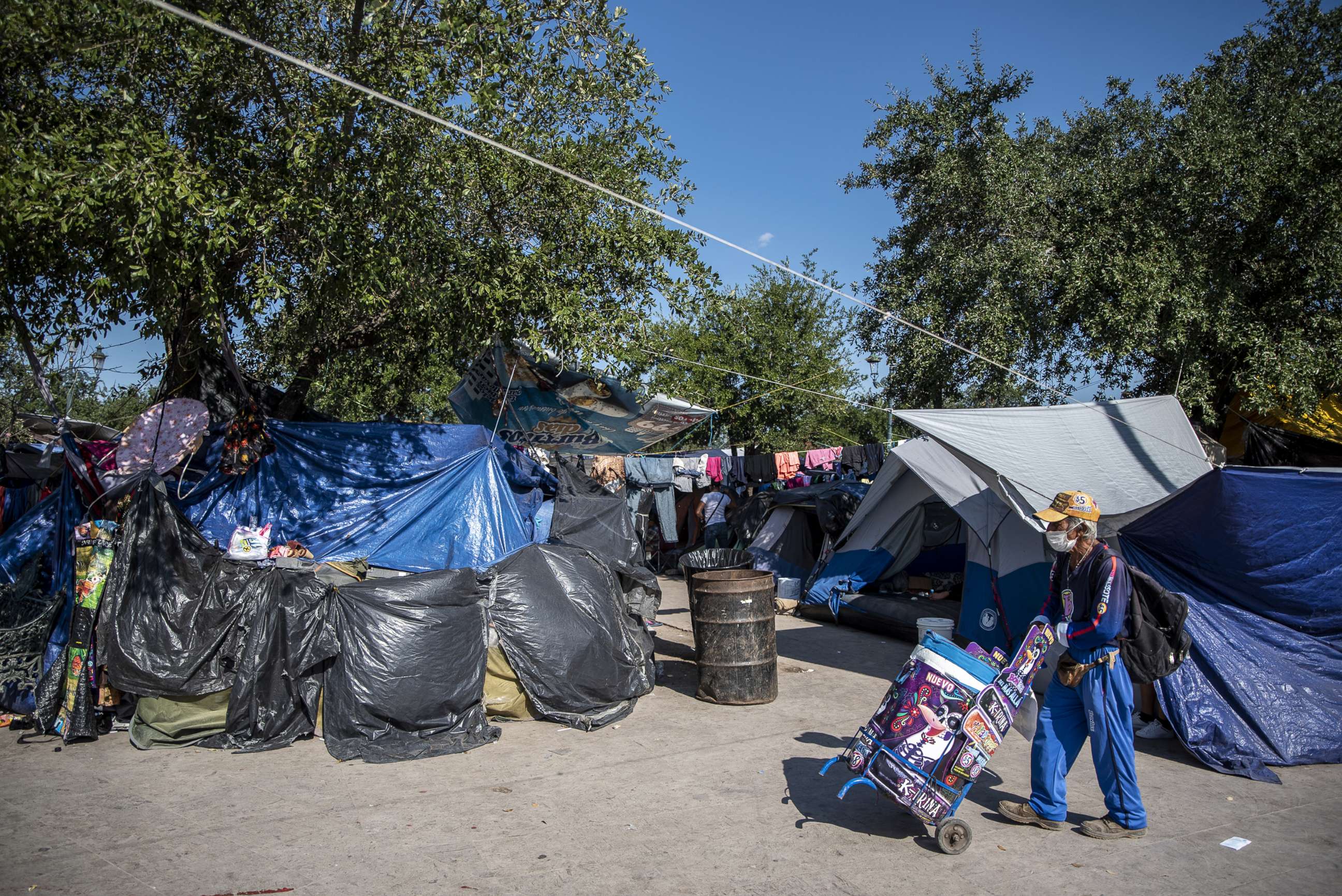
Jessica Leon has a brother living in Houston, Texas, and hopes to give her children a "good future" in the U.S. because in El Salvador they struggled with poverty and a lack of employment opportunities.
Leon said that she and her children live in a tent with one mattress that her children share, while she sleeps on the floor.
"For love and to realize our dreams, we endure, but it's very difficult," she said.
Next week, the Biden administration plans to begin processing and admitting migrants forced to wait in Mexico under the Trump administration's "Migrant Protection Protocols," three administration officials told ABC News.
The Biden administration is currently locked in a legal battle with a coalition of civil rights groups, led by the American Civil Liberties Union, over its use of Title 42.
The White House defended its use of the public health order in federal court as recently as last month, arguing that lifting it would lead to overcrowding at DHS facilities, and that an influx of migrants poses a public health risk.
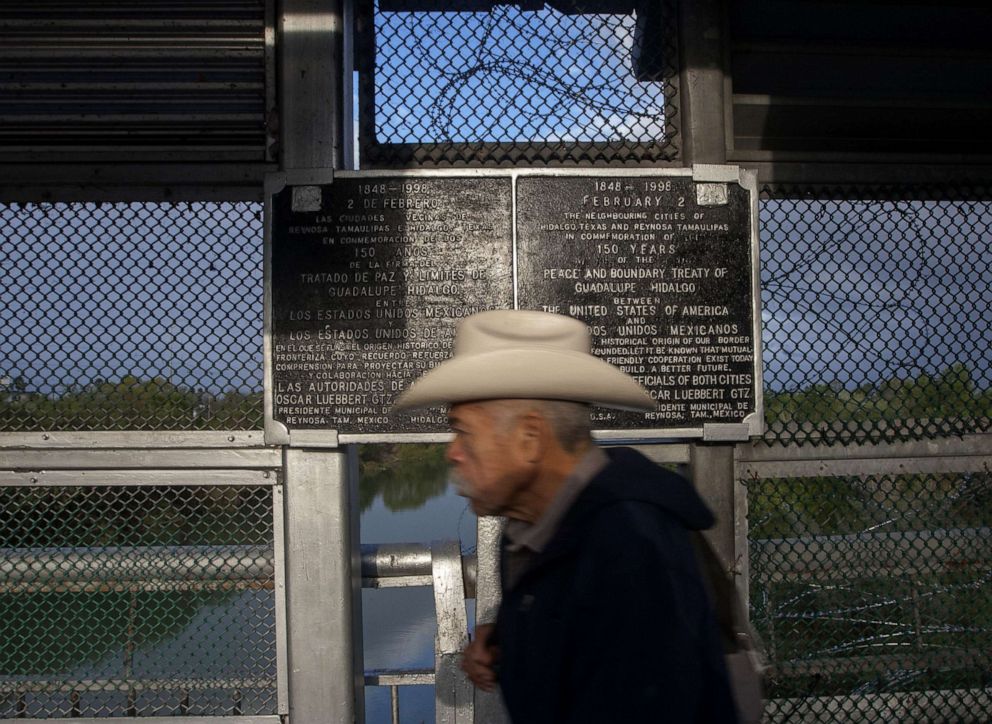
Rangel-Samponaro said that migrants caught in limbo hope that changes in U.S. immigration policies will give them a chance for a new beginning.
"What you're seeing is hope that Biden takes away Title 42, which he can at any second if he chooses to," Rangel-Sampanaro said. Eliminating the use of Title 42 would give the migrants a chance to make a claim of asylum, he said.
And for families living in the encampment in Reynosa, the hope of a better future for their children keeps them going.
"Trust me, it's hard, please keep us in mind because there are a lot of families suffering. The kids are the most vulnerable," Leon said.
ABC News' William Gallego, Luke Barr and Quinn Owen contributed to this report.




